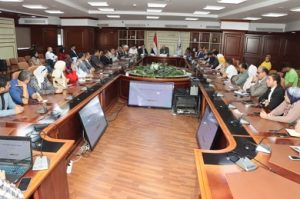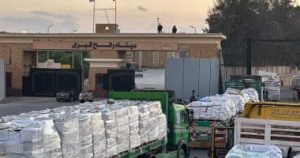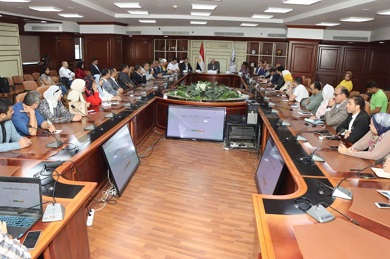Dr. Mohamed Hany Ghoneim, Governor of Beni Suef, chaired an extensive meeting as part of a series of preparatory meetings held by the governorate to discuss arrangements and preparations for hosting the 4th session of the Medical and Aromatic Plants Festival “Beni Suef 2025,” scheduled for the second half of October 2025. This is part of the governorate’s plan to develop the medical and aromatic plants sector, maximize the benefit from its natural and agricultural resources, and support the related industries as a promising sector in the governorate.
The meeting was attended by Bilal Habash, Deputy Governor and Chairman of the Organizing Committee for the conference and festival; Mohamed Gaber, Assistant Governor; Dr. Alaa Saeed, Secretary of the Medical and Aromatic Plants Committee; Engineer Dalia Qabil, Executive Director of Conest Company; Dr. Mohamed Amin, Deputy Director of the Agricultural Innovation Project; Mohamed Nabil, representative of the Export Council for Agricultural Crops; Ahmed Desouki, Director of the Governor’s Office; city heads; and representatives of relevant executive bodies from irrigation, agriculture, health, ambulance, culture, the National Council for Women, traffic, tourism, and departments of the general office including legal affairs, technical office, financial affairs, international cooperation, media, handicrafts industries, urban planning, investment, population unit, follow-up, the tourist promenade management on the corniche, advertising management, public relations, and several academics from Beni Suef and Nahda Universities.
The governor discussed with attendees a set of procedures for preparing and organizing the festival. It was agreed to hold the conference activities over Saturday and Sunday, October 18 and 19, 2025, with the opening session at the Local Administration Club and the conference at the university conference center, while the tourist promenade will host the festival events.
The festival is expected to witness broad participation from academic and research institutions, farmers, companies specialized in producing and manufacturing medical and aromatic plants, as well as representatives of international bodies concerned with agricultural development and green investment. It targets about 10,000 visitors and more than 240 exhibitors, in addition to youth participation from universities in Beni Suef, and inviting manufacturers of medical plants in distillation and drying fields to participate as exhibitors, with facilitated transportation for visitors to and from the governorate and an electronic marketing plan for the festival inside and outside Egypt.
The festival organization plan was reviewed, covering scientific, agricultural, and marketing axes. The governor emphasized the importance of good preparation, promotion, and marketing for the conference and festival in its first session hosted by Beni Suef, intensifying efforts and cooperation among all partners, especially regarding administrative and organizational aspects, as the festival is an opportunity to highlight Beni Suef’s position as a promising center for producing and exporting medical and aromatic plants, especially since it is one of the leading governorates in this field.
The governor also pointed out that hosting the festival aims to create an effective platform for cooperation between Egyptian companies, exchanging expertise and knowledge, contributing to developing production and export chains, opening new horizons for local and international investors, and enhancing the governorate’s strategy to exploit its comparative advantages in cultivating and producing medical and aromatic plants, exploring investment opportunities, and supporting related industries, especially in light of projects planned to be implemented in Beni Suef in this regard.
The meeting also reviewed and evaluated last year’s festival edition to benefit from it by maximizing positives and addressing any observations. The last session witnessed the participation of more than 60 exhibitors, 14 systems and institutions, 29 factories and companies, 5 digital solutions companies, 10 agricultural associations, and 11 service providers.













Recommended for you
Exhibition City Completes About 80% of Preparations for the Damascus International Fair Launch
Talib Al-Rifai Chronicles Kuwaiti Art Heritage in "Doukhi.. Tasaseem Al-Saba"
Unified Admission Applications Start Tuesday with 640 Students to be Accepted in Medicine
Egypt Post: We Have Over 10 Million Customers in Savings Accounts and Offer Daily, Monthly, and Annual Returns
His Highness Sheikh Isa bin Salman bin Hamad Al Khalifa Receives the United States Ambassador to the Kingdom of Bahrain
Al-Jaghbeer: The Industrial Sector Leads Economic Growth